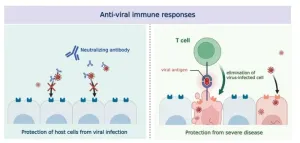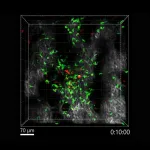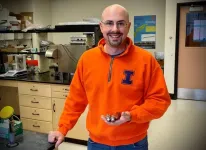(Press-News.org) Programmed cell death 1 (PD-1) is an important target for immune checkpoint inhibitor therapies that block its signaling and boost T-cell activity. PD-1 inhibitors have been approved for treating various types of cancer.
But PD-1 functions can vary between different cell and cancer types, either promoting or suppressing disease progression. Merkel cell carcinoma (MCC), a rare and aggressive form of skin cancer, responds well to immune checkpoint inhibitor therapy. However, it was previously unknown if MCC cells express PD-1 themselves, and unclear how exactly cancer cell-intrinsic PD-1 contributes to tumor growth.
A study led by investigators from Brigham and Women’s Hospital, a founding member of the Mass General Brigham healthcare system, identified a new mechanism through which PD-1 promotes MCC progression. Through a series of experiments, the researchers demonstrated PD-1 expression on MCC cells in preclinical models and patient tumor samples. They found that MCC-PD-1 receptor binding to its ligands accelerated tumor growth by activating the mammalian target of rapamycin (mTOR) pathway and generating mitochondrial reactive oxygen species (mtROS) to promote MCC growth.
The authors subsequently showed that inhibiting mTOR signaling and neutralizing mtROS suppressed MCC-PD-1-mediated tumor proliferation in mice. These findings, they suggest, might help in the development of new treatments to halt MCC progression even in patients lacking T-cell immunity.
“For the first time, our work identifies PD-1 as an MCC-intrinsic receptor that promotes tumor growth via downstream mTOR signaling and mitochondrial reactive oxygen species production,” said corresponding author Tobias Schatton, PharmD, PhD, of the Department of Dermatology. “Targeting this tumor-intrinsic PD-1 signaling network could help optimize immune checkpoint therapy regimens and improve MCC patient outcomes.”
in Science Advances.
END
Study identifies new PD-1 immune checkpoint mechanism promoting merkel cell carcinoma growth
2024-01-19
ELSE PRESS RELEASES FROM THIS DATE:
Vanderbilt chemist Ben Brown awarded $2.375M to develop nonaddictive painkillers with AI
2024-01-19
When Ben Brown, research assistant professor of chemistry, thinks about the opioid epidemic, he views the problem on a molecular level. Painkillers used legitimately in medicine, such as oxycodone, are highly addictive, but better understanding of how their molecules interact with proteins in the body could lead to the formulation of nonaddictive alternatives, he said.
In May, the National Institute on Drug Abuse awarded Brown $1.5 million over five years to further his work in this area. Brown, faculty affiliate of the Vanderbilt Center for Addiction Research and the Center for Applied Artificial Intelligence in Protein Dynamics, is developing artificial intelligence that ...
National champion tree program finds new home
2024-01-19
The National Champion Tree Program started 83 years ago at American Forests to discover the largest, living trees in the United States. Now, the program is moving from the organization’s headquarters to a new home in the School of Natural Resources at the University of Tennessee Institute of Agriculture (UTIA).
American Forests launched the Champion Tree Program in 1940. Its vision included establishing a nationwide laboratory for the study of forestry and trees. Being housed at Tennessee’s 1862 public land-grant university will advance the program’s understanding of big trees. “The National Champion Tree Program moving to UTIA means it can continue protecting ...
New AEM study evaluates potential disparities in restraint use in the emergency department at a minority-serving safety-net hospital
2024-01-19
Des Plaines, IL — A new study that contributes additional data to a growing body of evidence demonstrating disparities in restraint use in the emergency department (ED) has been published in the January issue of Academic Emergency Medicine (AEM), the peer-reviewed journal of the Society for Academic Emergency Medicine (SAEM). The study, titled Disparities in use of physical restraints at an urban, minority-serving hospital emergency department evaluates the association between race/ethnicity and the use of restraints in an ED population ...
CRISPR off-switches: A path towards safer genome engineering?
2024-01-19
Using CRISPR, an immune system bacteria use to protect themselves from viruses, scientists have harnessed the power to edit genetic information within cells. In fact, the first CRISPR-based therapeutic was recently approved by the FDA to treat sickle cell disease in December 2023. That therapy is based on a highly studied system known as the CRISPR-Cas9 genetic scissor.
However, a newer and unique platform with the potential to make large-sized DNA removals, called Type I CRISPR or CRISPR-Cas3, waits in the wings for potential therapeutic use.
A new study from Yan Zhang, ...
Evolution of the human immune system in the post-Omicron era
2024-01-19
It has been 4 years since the start of the COVID-19 pandemic. SARS-CoV-2 has yet to be eradicated and new variants are continuously emerging. Despite the extensive immunization programs, breakthrough infections (infection after vaccination) by new variants are common. New research suggests that human immune responses are also changing in order to combat the never-ending emergence of new SARS-CoV-2 variants. Specifically, it has been discovered the immune system that encountered breakthrough infection by the Omicron variant acquires enhanced immunity against future versions of the Omicron.
A team of South Korean scientists ...
First therapeutic target for preserving heart function in patients with pulmonary hypertension
2024-01-19
A team led by Dr. Guadalupe Sabio at the Centro Nacional de Investigaciones Cardiovasculares (CNIC) in Madrid has discovered a possible therapeutic target for pulmonary hypertension.
The study, published in the journal Science Advances, identifies the first therapeutic target that can be modulated to preserve cardiac function in pulmonary hypertension, providing hope in the fight against this rare but fatal disease for which there is currently no cure.
Pulmonary hypertension is a condition of elevated blood pressure in the arteries that carry deoxygenated blood to the lungs. This increased pulmonary blood pressure puts the heart under continuous strain ...
Endless biotechnological innovation requires a creative approach
2024-01-19
Scientists working on biological design should focus on the idiosyncrasies of biological systems over optimisation, according to new research.
In a study, published today in Science Advances, researchers from the Universities of Bristol and Ghent have shown how exploring the unknown may be the crucial step needed to realise the continual innovation needed for the biotechnologies of the future.
Recognising the role of open-endedness in achieving this goal and its growing importance in fields like computer science and evolutionary biology, the team mapped out how open-endedness is linked to bioengineering practice today and what would be required to achieve it in ...
The secret life of CD4+ T cells: from helpers to melanoma fighters
2024-01-19
In the study led by the Peter Doherty Institute for Infection and Immunity (Doherty Institute) and published in Science Immunology, the researchers found that CD4+ T cells, traditionally called ‘helper T cells’ for their role in aiding the activation of other immune cells, are remarkably effective in controlling melanoma.
University of Melbourne’s Dr Emma Bawden, Postdoctoral Researcher at the Doherty Institute and lead author of the study, said this discovery challenges the conventional understanding of the role of CD4+ T cells in cancer immunity.
“Our ...
Study says ice age could help predict oceans’ response to global warming
2024-01-19
A team of scientists led by a Tulane University oceanographer has found that deposits deep under the ocean floor reveal a way to measure the ocean oxygen level and its connections with carbon dioxide in the Earth's atmosphere during the last ice age, which ended more than 11,000 years ago.
The findings, published in Science Advances, help explain the role oceans played in past glacial melting cycles and could improve predictions of how ocean carbon cycles will respond to global warming.
Oceans adjust atmospheric CO2 as ice ages transition to warmer climates by releasing the greenhouse ...
From snack to science: Innovative grant brings popcorn into the classroom
2024-01-19
URBANA, Ill. — In a few years, popcorn could become a standard element in science classrooms across Illinois and the nation. With funding from a new USDA grant, a University of Illinois Urbana-Champaign crop scientist and collaborating educators are developing a popcorn-based curriculum to reinforce concepts around agricultural science, artificial intelligence, biotechnology, computer science, genomics, research methods, and more for 4-H and high school students.
The funding may be new, but Tony Studer has proselytized ...






